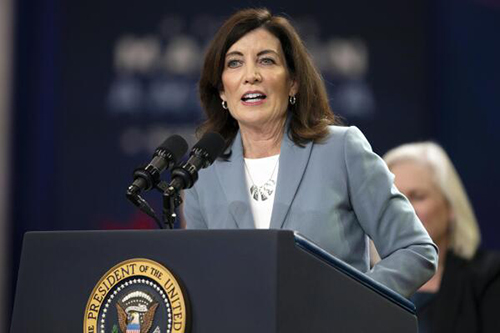|
Getting your Trinity Audio player ready...
|
Edited by: TJVNews.com
In a notable clash over urban transportation policy, President-elect Donald Trump has voiced strong opposition to New York Governor Hochul’s revised congestion pricing initiative, characterizing it as “the most regressive tax known to womankind.” The disagreement highlights ongoing debates about urban mobility, economic recovery, and social equity in America’s largest city.
According to a report on the Vois Es Nais website, Governor Hochul’s updated plan represents a significant shift from earlier versions, introducing a $9 toll for vehicles entering designated areas of Manhattan—a substantial reduction from the initial $15 fee that faced widespread criticism, particularly from middle- and working-class residents. The revised framework incorporates several measures designed to minimize the impact on vulnerable populations while still addressing the city’s persistent traffic and environmental challenges.
“Your toll today is $0. We’re implementing a $9 toll instead of a $15 toll, so we’re saving you 40%” is perfect NY politician logic. #congestionpricing pic.twitter.com/xwh4RWUmwB
— robmillertime (@robmillertime) November 14, 2024
A key component of the new proposal is the Low-Income Discount Plan, which offers a 50% reduction in fees for residents earning less than $50,000 annually, applicable after completing ten trips within a month. According to Governor Hochul, this modification could result in annual savings of approximately $1,500 for frequent commuters, representing what she describes as “a substantial benefit for many families.”
Despite expressing respect for Governor Hochul and a willingness to collaborate on other matters, Trump’s criticism of the congestion pricing plan has been pointed and multifaceted. His opposition centers on several key arguments, as was noted in the VIN report.
Trump statement on congestion pricing in NYC >> pic.twitter.com/r35oLJON8B
— Kevin Frey (@KevinFreyTV) November 14, 2024
Trump contends that implementing such fees could impede New York City’s ongoing economic recovery efforts. He has also argued that the policy could place New York at a competitive disadvantage compared to other metropolitan areas. The president-elect highlighted practical concerns about the system’s implementation, noting it “complicates both driving and personal record-keeping” and he emphasized that the policy would disproportionately affect those already facing financial challenges
“I respect Governor Hochul and look forward to working with her to improve both New York and the nation, but I disagree with this congestion tax decision,” Trump stated, as per the information provided in the VIN report, as he framed his opposition within a broader context of cooperation between federal and state leadership.
The debate occurs against a backdrop of evolving relations between the two leaders. Despite previous disagreements, recent reports indicate a more constructive dialogue following Trump’s election victory. However, VIN reported that their differing approaches to urban transportation policy highlight broader ideological divisions about how to address city infrastructure and environmental challenges while maintaining economic vitality.
Hochul’s administration maintains that the revised congestion pricing strategy serves dual purposes: reducing traffic congestion and addressing environmental concerns related to vehicle emissions. The governor’s office argues that the $9 toll represents a more balanced approach than previous iterations, attempting to achieve environmental goals while acknowledging economic realities facing New York residents.
The disagreement over congestion pricing potentially foreshadows future tensions between federal and state approaches to urban policy. Indicated in the VIN report was that Trump’s assertion that “as long as the congestion tax is in place, it will be difficult for New York City to fully recover” suggests this issue may remain a point of contention as both leaders work to balance economic growth with environmental and infrastructure needs.
As the plan moves forward, its implementation and effectiveness will likely be closely monitored by other major cities considering similar measures to address urban congestion and environmental concerns. The outcome in New York could significantly influence future urban transportation policies across the United States.





